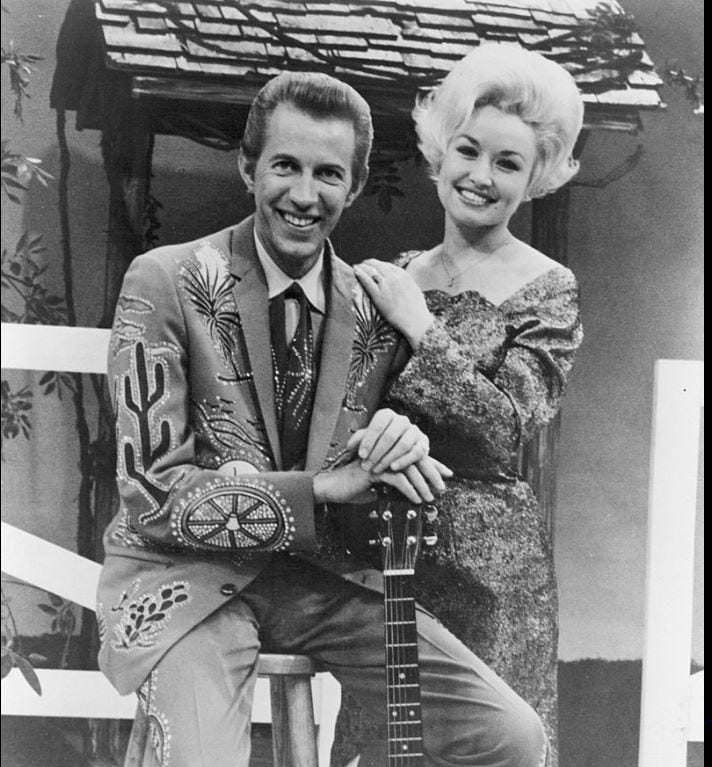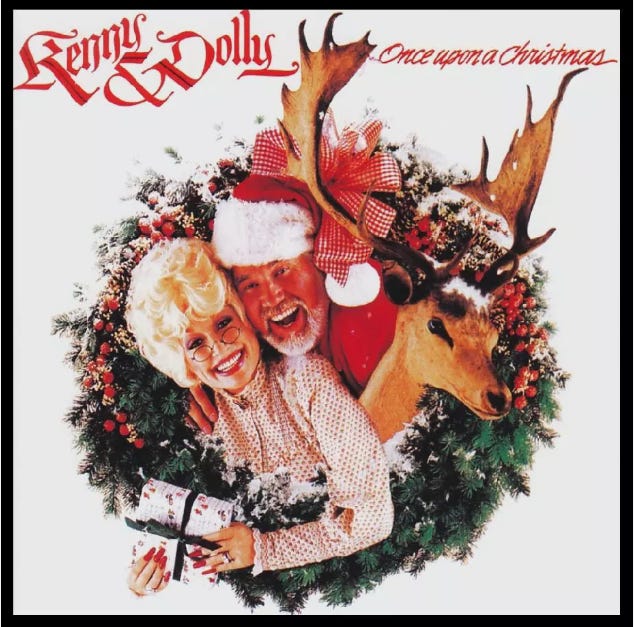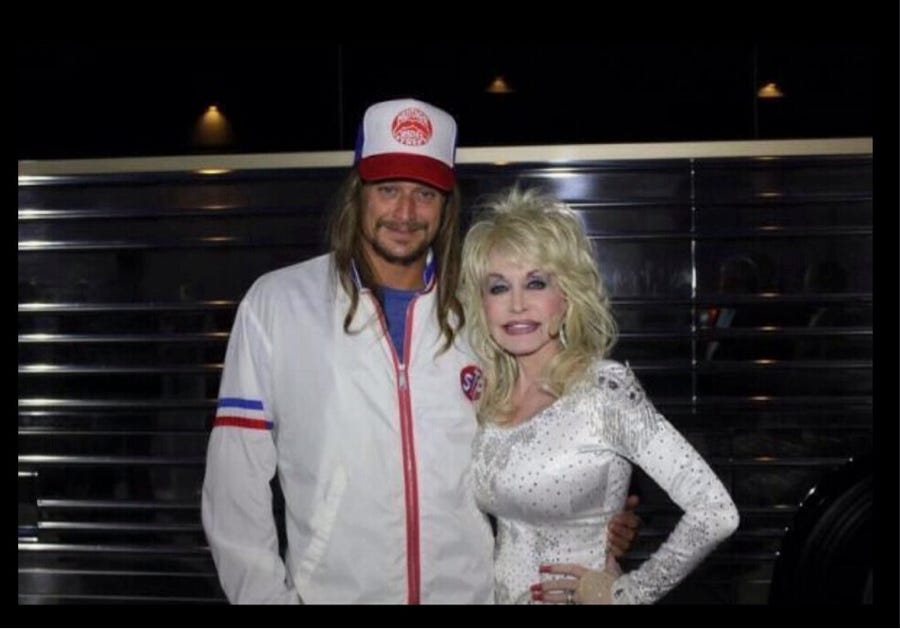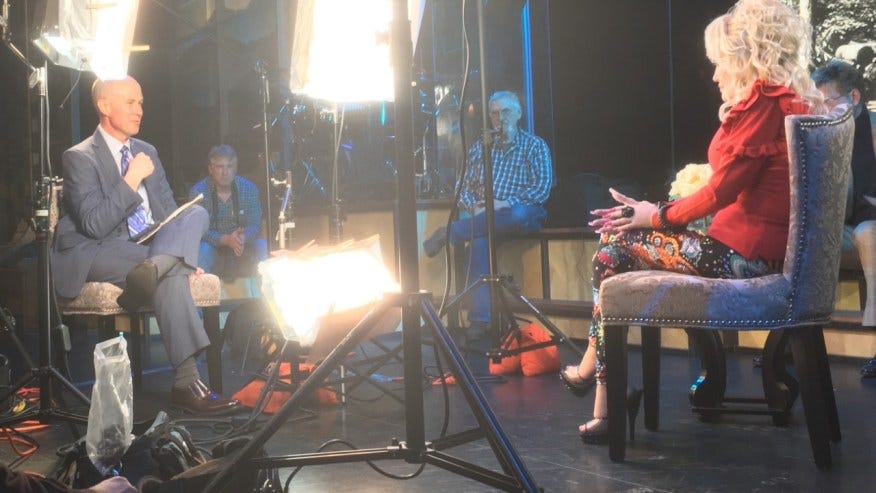Lesson 18: Dolly Parton and the power of collaboration
Somewhere along the way, collaboration became a dirty word.
At last for some, anyway. For them, gone is the old-fashioned elementary school playground maxim that getting along and working together is required behavior whether you feel like it or not.
That’s surely the case in Washington D.C. where one of the major political parties is led by a man who almost got shot in the head and the other is led (for at least a little while longer) by a man who many speculate has something wrong in the head. No wonder their respective followers have lost their collective heads in a battle royale for total domination, a cage match to determine who’ll be the last crazy person standing.
With hints of grade-school recess gone bad, our nation’s most prominent leaders - alas, the people we’ve chosen to represent and govern us on our behalf - see themselves as “good guys” and everyone else as “bad guys.” Who’s right depends on which cable news you watch. The only thing both sides agree on is that the worst thing you can do is (clutch my pearls) to reach out, to attempt to understand, and - God forbid - to collaborate.
Collaboration with anyone who isn’t on your side has become, for the vocal and the in-charge, a synonym for “giving in” or “rolling over.”
And then there’s Professor P.
While the planet hunkers down and stocks up on bottled water, ramen noodles, and ammo, Dolly Parton quietly but consistently keeps proving the power of collaboration - the redemptive beauty of joining forces with someone who isn’t exactly like you, of joining hands in unlikely partnerships to try a different approach, to learn a new way of doing things, and to create something good.
I know you’re not supposed to trust stuff you read on Wikipedia, but I really like this definition: Collaboration - the process of two or more people…working together to complete a task or achieve a goal.
Funny enough, Webster lists an alternate definition for collaboration, and it seems more applicable this election season:
Collaboration - to cooperate with or willingly assist an enemy of one's country and especially an occupying force.
In this session of “The School of Dolly,” we’ll examine the power of one leader who’s brave enough to step into seemingly uncomfortable collaborations and who’s perfectly comfortable sharing her mind or, if warranted, changing it. We’ll observe the impact of one who isn’t afraid of “the other,” who doesn’t isolate “the other” as a threat that must be neutralized, and who seeks opportunities to work with “the other” in the name of creativity and commercial success.
Dolly Parton has a long track record as a creator and an entrepreneur who plays well with others. After all, it’s how she got her start. My first memory of Dolly was on a 1970’s TV show singing alongside old-school country crooner Porter Waggoner who, at that time, was the big star. Dolly was his pretty sidekick with big hair and big...personality.
That didn’t last long. Soon, Dolly said no to being anybody’s sidekick and yes to being a global solo superstar. After her start as second-fiddle, you’d think she’d spend the rest of her life avoiding collaborative efforts. But she did the opposite. Unlike others who soared to fame only to egotistically struggle with sharing a spotlight, Dolly seemed obsessed with dragging people into the spotlight with her, something she’s done throughout her six decade career.
To the day she died, my Momma’s favorite Christmas album was Dolly’s 1984 collab with Kenny Rogers. “Once Upon a Christmas” dropped the year after the duo topped the charts with “Islands in the Stream.” To me, her duet Christmas album showcases Dolly’s stunning skills as a songwriter and her remarkable ability to maximize her own impact by joining forces with another. There’s not a single track she couldn’t have recorded as a solo thereby owning the sound and pocketing the cash. But she didn’t. She collaborated. And it worked.
(Sidebar: The eponymous single “Once Upon A Christmas” written by Dolly and performed by Dolly and Kenny is among the most under-appreciated Christmas songs of all time. IMHO as the kids say. YouTube it.)
Forty years later, Dolly’s list of collabs continues to grow. Her choice of collaborative partners has consistently strayed far from the safe predictability of her country roots, a decision that’s exposed her to more than a little criticism. Stars like Steven Tyler, Beyonce’, Sting, Lizzo, Elton John, Debbie Harry, Ringo Star, Pit Bill, and most recently Post Malone have clamored to partner with Dolly in genre-bending projects achieving varying levels of critical acclaim and commercial success. Some of her collabs have been flat-out panned by the critics, and most have yet to come anywhere close to the success of her solo projects (think: Jolene, I Will Always Love You). But as far as I can tell, Dolly doesn’t care. Like it or hate it, she just keeps collaborating.
Why? Because she needs the money? Because she’s desperate for attention? Because she’s lonely and needs a friend?
I believe her real motivation can be found in her response to a recent collaboration controversy.
After her duet with rapper Kid Rock on her 2023 “Rockstar” album, Dolly admitted to the Hollywood Reporter that she caught flack for working with the scandal-plagued bad boy whose comments about Donald Trump and gay rights landed him on the “to-be-canceled” list.
Her response?
“I said, ‘Hey, just because I love you don’t mean I don’t love Kid Rock. Just because I love Kid Rock don’t mean I don’t love you.’” Parton recalled. “I don’t condemn or criticize. I just accept and love. I love everybody. I don’t criticize, I don’t condone nor condemn. I just accept them. But anyhow, just because I love you don’t mean I don’t love Kid Rock in that God way.”
Dolly wasn’t done. In a flat-out rejection of our trigger-happy cancellation culture and the global epidemic of easily hurt feelings, Professor P. shared her approach to living and leading in a world that’s hunkered down and p***** off.
“We all make mistakes,” she said. “We don’t all get caught at it. But also when somebody makes a mistake, it depends on who they are. That’s what God is there for. Now, I happen to believe in God; I’m a faith-based person, so therefore I am able to see it like that. A lot of people don’t, but even still, everybody deserves a second chance. You deserve to be innocent until you’re proven guilty. Even when you’re proven guilty, if God can forgive you, so can I. If God can forgive you, we all should forgive one another.”
And all God’s people said...(crickets)...anyone?
Simply put - Dolly loves everyone. That love without judgement is the key that opens the prison door and frees her up to stand side by side with another human being in the name of making something wonderful - even when they may not see eye to eye on everything.
I’m struck by the number of people who profess their undying adoration for Dolly Parton but who would not, if they were honest, be able to repeat her statement and genuinely mean it.
Instead, we hear the exact opposite, often in the form of, “If (fill in the blank) gets elected, I’m moving,” or “So-and-so is destroying America.” And then, without taking a breath, you’ll hear the same person say, “And oh, by the way, I just love Dolly Parton, don’t you?”
More crickets…
Aspiring leaders, take note: Professor P. shows that, when pursued with a heart of acceptance and appreciation, collaboration when possible within your sphere of influence is way more fruitful than hanging out in your silo with others who look and think and act just like you. Hollering non-stop about how bad “they” are and how good “we” are may win votes, but there’s living proof in the hills of East Tennessee that there’s a better way of living and a better way of doing business.
So here’s your homework:
In your sphere of influence, how are you collaborating with others to create something wonderful? Inventory and assess. Can more be done? Is there an opportunity to reinforce the resources, to reiterate your commitment, and to rededicate yourself to the power of the partnership?
Ask yourself - who am I “othering?” With whom am I not willing to collaborate? Who are the “bad guys” in my world? Can you say of them what Dolly said about Kid Rock? (Reminder: “I don’t condemn or criticize. I just accept and love. I love everybody. I don’t criticize, I don’t condone nor condemn. I just accept them.”) If not, can you consider the damage that’s doing to yourself, your community, your organization, and the people you aspire to lead?
Ask yourself - with whom can I collaborate in a new way that serves me, serves them, and serves the greater good? Not just someone who fits your ideal of the way things ought to be. Someone who may make you a bit uncomfortable but who shares a common vision? Is there a pathway to partnership that’s worth pursuing despite differences and divisions that previously have kept you separate?
Collaboration isn’t a dirty word. It’s a gift. And, it’s a skill practiced obsessively by effective leaders who know how to build brands, make a profit and, in the process, make the world a better place.
Finally - I get it. Dolly Parton doesn’t have to fix the border or deal with Putin or save Social Security. She doesn’t have to meet your payroll or answer to your congregation of fellow believers or coexist with that jerk who works in your office. She just makes music with other rich people, right?
Wrong, because not only does that minimize the vastness of her business empire upon which thousands of employees depend for their livelihood, it ignores the undeniable likelihood that, if she were in charge of your office or congregation or the United States of America, there’d be less finger-pointing and fist-shaking and more handshaking and hugging. I’d be willing to put money on it.
I once asked Dolly if she ever thought of running for public office. “Oh, there are already are enough boobs in Washington,” she answered without the slightest pause.
And all God’s people said (no crickets) AMEN.






Inspiring!
This is the BEST one yet! Thank you so much, Josh,